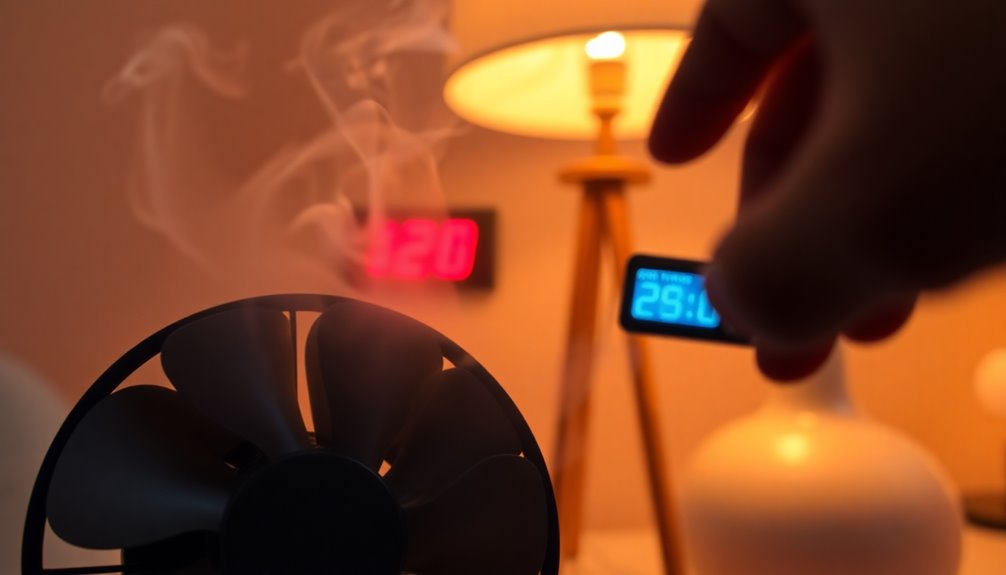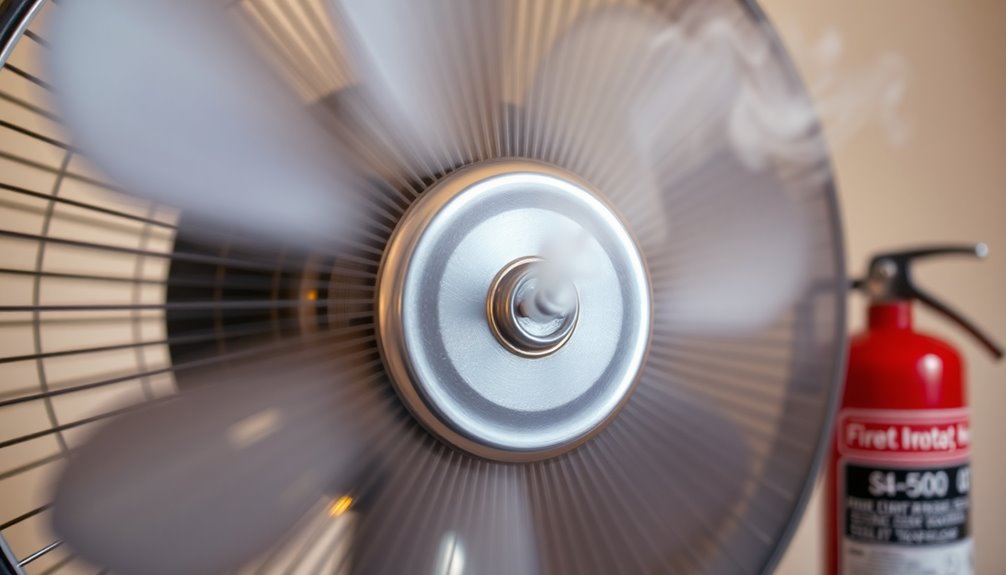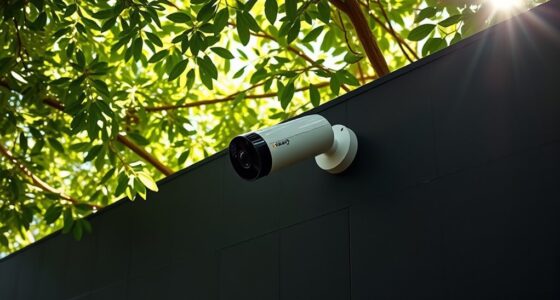If a fan overheats, it can become a fire hazard, potentially leading to dangerous situations. Dust buildup, unstable surfaces, and unattended operation are common causes of overheating. To prevent this, inspect and clean your fan regularly, unplug it when not in use, and guarantee proper ventilation. Keep an eye out for unusual sounds or smells. By following these safety measures, you can protect your home and family from risks—find out how to implement these tips effectively.
Key Takeaways
- Overheating can cause fans to malfunction, leading to potential electrical fires or damage to the appliance.
- Signs of overheating include unusual sounds, burning smells, or excessive heat emanating from the fan.
- Regular maintenance, such as cleaning and inspecting, can help prevent overheating incidents.
- Always unplug the fan if overheating is detected, and keep flammable materials away from its vicinity.
- Install smoke alarms and have a fire extinguisher accessible to ensure safety in case of fire emergencies.

When it comes to keeping cool, you mightn't think much about your fan, but ensuring its safety is essential to prevent overheating. Overheating can occur for various reasons, and knowing the common causes can help you maintain your fan effectively. One of the primary culprits is dust buildup, which can obstruct airflow and lead to increased temperatures. Regularly inspecting and cleaning your fan components is a critical safety tip; it helps prevent dust accumulation that could pose a fire risk.
Another important safety tip is to avoid leaving fans unattended, especially when you're sleeping or not in the room. Fans running without supervision can increase the risk of overheating, which can lead to potential fire hazards. If you notice your fan emitting unusual sounds like buzzing or a burning smell, unplug it immediately to avoid further damage or serious fire risks. Early detection of such issues is essential for your safety.
Placement of your fan also matters. Make sure it's on a stable surface to prevent tipping, which could result in electrical hazards during operation. A fan that falls mightn't just break but could also cause a short circuit or spark, leading to a dangerous situation.
You should also look for fans with thermal protection features. These products automatically shut off if they detect overheating, adding an extra layer of safety you might appreciate. Additionally, consider investing in best home security systems that can monitor your home while you are away, providing peace of mind against potential hazards.
Don't forget to check your smoke alarms regularly, as they play a critical role in fire safety. If a fan does overheat and causes a fire, having working smoke alarms can be the difference between a minor incident and a disaster. Staying proactive about your fan's safety can greatly reduce the likelihood of overheating and its associated risks.
Frequently Asked Questions
What to Do When Your Fan Overheats?
When your fan overheats, the first thing you should do is unplug it immediately to prevent any fire risks.
Check for any unusual smells or noises, and feel the motor housing for excessive heat.
Clean the fan regularly to avoid dust buildup, and lubricate the motor bearings to reduce friction.
If it keeps overheating despite your efforts, it's best to consult a technician for a thorough inspection and necessary repairs.
What Are the Safety Precautions for Electric Fan?
When using an electric fan, you need to take safety precautions to prevent accidents.
Regularly clean your fan to avoid dust buildup, which can obstruct airflow. Always unplug it before cleaning for safety.
Listen for any unusual sounds that might indicate a problem.
Don't leave the fan running unattended, especially overnight.
Finally, guarantee it's placed on a stable surface and away from flammable materials to minimize risks.
Your safety matters!
What Happens if an Electric Fan Overheats?
If you notice your electric fan getting unusually warm, it might start underperforming, offering less airflow and raising the temperature around you.
You could hear strange noises like grinding or shrieking, signaling something's wrong inside. A burning smell is a serious warning; it means the motor's overheating and could risk electrical fires.
Your fan might even draw excessive current, leading to further damage. Regular maintenance can help you avoid these issues and keep your fan running smoothly.
How Long Can You Safely Leave a Fan On?
You can safely leave a fan on for extended periods, as they're designed for continuous use.
However, it's wise not to leave it unattended or running overnight, especially if it's showing signs of wear.
Regularly clean it and guarantee it has proper ventilation.
Keep an eye out for any unusual noises or smells, as these can indicate potential issues.
Taking these steps helps maintain safety and efficiency while enjoying a cool breeze.
Conclusion
So, if your fan overheats, it's not just a minor inconvenience—it's like inviting a fire-breathing dragon into your living room! But with a few simple safety tips, you can banish that beast and keep your cool. Always keep an eye on your fan, clean it regularly, and never leave it unattended for too long. By taking these precautions, you can guarantee your fan stays loyal and reliable, rather than turning into a fiery menace!









